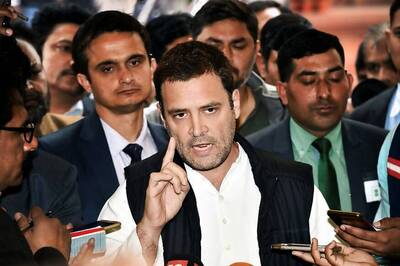
views
Bangkok: Climate experts and state representatives from 105 countries released Friday a 24-page report on means of mitigating the worse impacts of global warming after five-days of heated debates to reaching a consensus on the document.
The report, which focused on the economic implications and technological options for tackling global warming, stated that emissions must start declining by the year 2015 to prevent the world's temperature from rising more than 2 degrees Celsius over pre-industrialised temperatures.
The report also states that the low costs of buying insurance, through the use of technologies currently available, to avoid a climatic catastrophe in the coming decades is less than 0.1 per cent of world gross domestic product (GDP) per annum.
"The naysayers have always said that this will wreck our economies," said Hans Verolme, director of the World Wildlife Fund for Nature's (WWF's) Global Climate Change Programme.
Verolme added that the cost of doing nothing is 20 times worse than paying for technologies today. "This is a no brainer," he said, adding that 40 cent of the solution is better efficiency of existing infrastructure.
"It's a great report and the conclusions are quite strong," said Greenpeace's Bill Hare, one of the led authors of report. Though he admitted that it's "a little hard to read."
The panel's first report, released in February in Paris, confirmed that global warming was happening while the second, issued in April in Brussels, focused on the impact of the phenomenon on the world's populations and species.
China played a lead role in the third report by sending the largest delegation to Bangkok.
"They showed a flexibility to a change in their views in order to insure the success of the report," said Hare.
Many climate experts claim the costs of saving the planet are miniscule compared with global warming's potential damages, but it is important that politicians also acknowledge this in the IPCC's third report of 2007.
The Bangkok meeting of the United Nations' Intergovernmental Panel on Climate Change (IPCC) attracted 30 of the world's leading climate experts and more than 217 government representatives from 105 countries whose task it is to fine-tune the report, which seeks an international consensus on how to reduce greenhouse gases and, perhaps more importantly, how much it would cost.
Political acceptance that it is economically and technologically possible to slow global warming is deemed an important stepping stone toward action.
After the Bangkok IPCC talks, the next two important meetings for climate change are the June summit of the Group of Eight (G8) leading industrialized countries in Germany and an end-of-the-year environmental summit in Bali to set world targets on emissions reductions.
"I think what we need from the G8 summit is a clear message that these leading economies are committed to keeping temperature rises below 2 degrees and secondly that they will do what it takes to reach an agreement in Bali to start formal negotiations," said Verolme on Thursday on the sidelines of the IPCC.



















Comments
0 comment